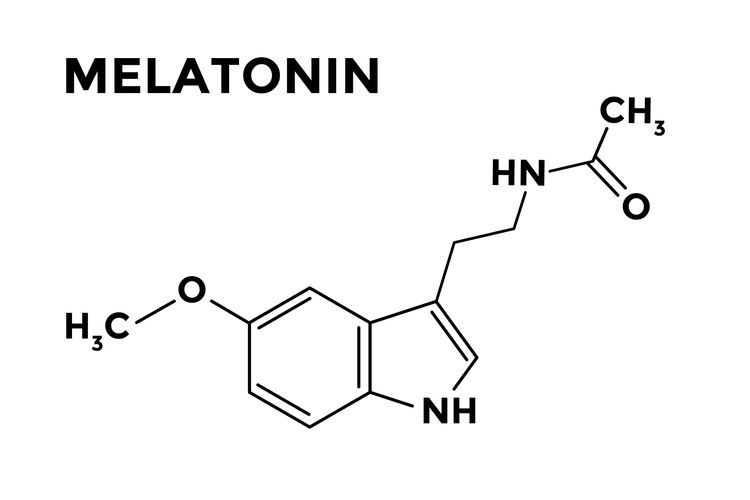Melatonin is a hormone produced by the pineal glands of the brain. It plays a vital role in promoting healthy and peaceful sleep. People suffering from sleep disorders prefer taking melatonin in their natural form or as supplements. It cannot be denied that melatonin helps to cope up with the main function of the body, thereby maintaining the circadian rhythm.[1]

What is the circadian rhythm?
The circadian rhythm is the internal clock of the body that helps to promote peaceful sleep. It is very much like the alarm clock assisting the body in deciding when it should go to sleep and when it should wake up.
The circadian clock of the body is found in the suprachiasmatic nucleus of the brain. It works depending on the light and dark pattern, thereby helping the brain to maintain a proper sleep cycle.[2] Based on the information collected by the brain, the pineal gland releases melatonin during the night and prevents it during the day.
What is melatonin used for?
Being a natural hormone, melatonin does not cause many side-effects. It is for this reason that the doctors often advise to take up natural supplements. Some of the prominent uses of melatonin include the following.[3]
- Sleep disorders
One of the most significant benefits of using melatonin is that it plays a vital role in treating sleep disorders. Not only does it help to improve sleep duration, but it also contributes to lessen the time one takes to sleep.
Taking up melatonin is far better than taking drugs since it helps to have positive results. Not only does melatonin treat sleep disorder issues due to jet lag, but it also contributes to helping people with insomnia.
- Treats headache
The melatonin hormone is known to help treat chronic headaches. It has the most potent impact on treating cluster headaches and migraines. However, it is necessary to determine the dosage to find the perfect amount for treating headaches.[4]
- Cancer treatment
Various studies have shown the positive impact of melatonin in suppressing lung, breast, renal, and colon cancer. Melatonin therapy, when clubbed with radiation therapy and chemotherapy, has positive impacts.
In most cases, melatonin helps to control cancer, thereby preventing the progressive stage. It is necessary to check the supplements one is taking. However, it is suggested that before starting melatonin supplements, one should consult the doctor.
- Tinnitus
Not a lot of people are aware of tinnitus, but melatonin has helped combat and lower the symptoms of tinnitus. This is because it helps to improve sleep patterns.
- Alzheimer’s disease
With increasing age, the melatonin levels tend to reduce. This is mostly found in people who have Alzheimer’s. However, melatonin can help prevent rapid cognitive decline in people who have Alzheimer’s.
Is melatonin safe?
One of the most asked questions about melatonin supplements is if it is safe.[5] If you are using melatonin for a short-term to deal with your sleep issues, then it can be pretty useful and safe. But, the long-term impacts are not yet known.
The safety of melatonin supplement consumption totally depends on the age and health of the individuals.
Melatonin tends to cause drowsiness in older adults. However, the impact of it on pregnant women isn’t clear either.
Should children be given melatonin?
Children suffering from sleep issues can easily overcome it if they are made to follow a proper bedtime routine.[6] Children should not be given melatonin even for a short term since it can prove to be fatal. Studies have shown that melatonin supplements tend to interfere with the sleep pattern, growth, and development pattern of the kids.
If you are planning to give your child melatonin, it is better than you consult the pediatrician. It suggests you provide the lowest dose to the child. Melatonin, for children and adults, is available in different supplemental forms such as chewable, pills, gummies, and more. However, one should surely keep a check with the dosage.

Melatonin Dosage
Melatonin is considered to be safe by doctors and healthcare providers. However, there may be side effects depending on the amount that one takes it in. Too much of melatonin is undoubtedly going to show a lot of health risks, especially in older adults.
It is essential to consult the doctor and follow a proper dosage of the medicine depending on the age.[7]
Melatonin overdose
Accidental overdose is very common among people taking melatonin supplements. However, the symptoms usually vary, and too much melatonin can increase your sleepiness also.[8] It may interact and can have side effects that may lead to your mind becoming alert. In conditions like this, it will become tough to sleep.
Some of the common symptoms of a person overdosing in melatonin include that of
- Headache
- Stomach ache
- Joint pain
- Anxiety
- Diarrhea
- Irritation
Melatonin may also hamper your blood sugar level. One should consider talking to a doctor before starting melatonin supplements because it can spike up your blood pressure. If you notice any side effects, you should report it to your doctor immediately.
When should you take melatonin?
The time in which you take your melatonin supplements has a vital role to play.[9] Taking it too late or too early will eventually impact your circadian rhythm. This will hamper your sleep and wake cycle.
As per experts at The National Sleep Foundation, a healthy individual should take melatonin 2 hours before sleeping.
People who travel frequently should take it two days before their scheduled departure to avoid jet lag. This can play an important role in adjusting with the time zone.
Can melatonin be found in foods?
Melatonin is found in several foods. Thus, if you don’t want supplements, you can also try these foods.[10] Pistachio nuts have the highest concentration of melatonin. Apart from that, eggs and fish are also excellent choices to make. Some of the other sources from where you can get melatonin include peppers, mushrooms, tart cherries, grapes, and more.
Melatonin can support human bodies in many ways. However, more research needs to be done to determine how and why it promotes healthy sleep. This can further play an essential role in treating various illnesses as well.
[1] https://www.ncbi.nlm.nih.gov/pmc/articles/PMC5405617/
[2] Lerner A.B., Case J.D., Takahashi Y., Lee T.H., Mori W. Isolation of melatonin, the pineal gland factor that lightens melanocytes. 1958.
[3] Bubenik G.A. Gastrointestinal melatonin: localization, function, and clinical relevance. Dig. Dis. Sci. 2002;47:2336–2348. [PubMed] [Google Scholar]
[4] https://www.ncbi.nlm.nih.gov/books/NBK534823/
[5] Martin M.T., Azpiroz F., Malagelada J.R. Melatonin and the gastrointestinal system. Therapy. 1998;53:453–458. [PubMed] [Google Scholar]
[6] Slominski A., Wortsman J., Tobin D.J. the cutaneous serotoninergic/melatoninergic system securing a place under the sun. FASEB J. 2005;19:176–194. [PubMed] [Google Scholar]
[7] Illerova H. Melatonin rhythm in the human milk. J. Clin. Endocrinol. Metab. 1993;77:838–841. [PubMed] [Google Scholar]
[8] Axelrod J., Weissbach H. Enzymatic O-methylation of N-acetylserotonin to melatonin. Science. 1960;131:1312. [PubMed] [Google Scholar]

